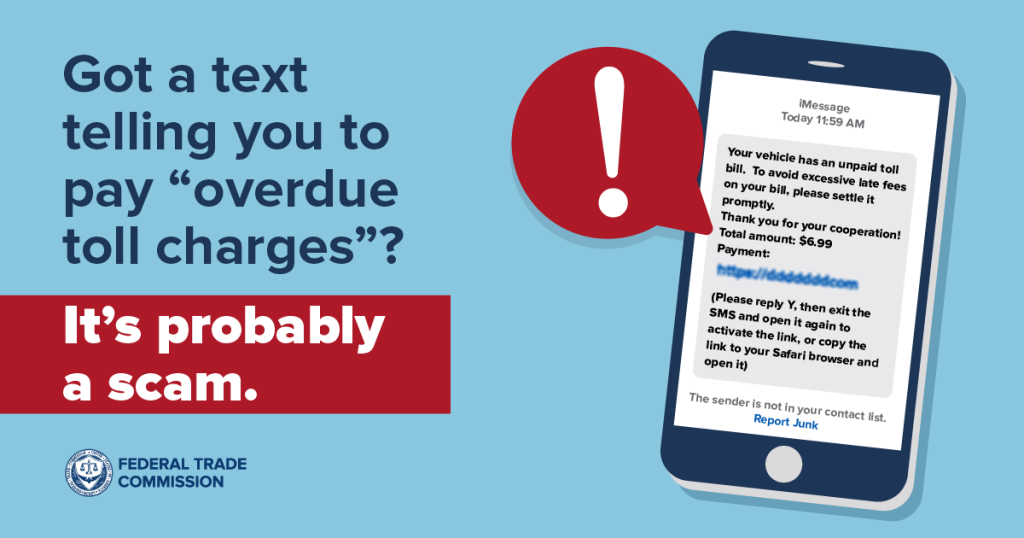Truck drivers in Illinois already face many dangers on the road—from heavy traffic to long hours behind the wheel. Now, they have a new threat to worry about: a text scam that aims to steal their hard-earned money. The Federal Trade Commission (FTC) has issued an urgent warning to truckers in the Land of Lincoln about this scam, which is causing extra concern among drivers across the state.
The New Scam: Unpaid Toll Message
Recently, truck drivers began receiving text messages that claim they owe money for unpaid tolls. The message warns of serious consequences if the driver does not settle the supposed debt immediately. These texts are designed to look official and to create a sense of urgency. The scammers hope that drivers, worried about potential fines or penalties, will click on links or provide personal information, ultimately leading to fraud and financial loss.
The scam is particularly troubling in Illinois because of the widespread use of the Illinois Tollway. Truckers who travel on these highways might sometimes have unpaid tolls, which makes them more vulnerable to such fraudulent messages. However, the important point to note is that these text messages are not coming from the Illinois Tollway. Instead, criminals are impersonating the Tollway to trick drivers.
Warning from the Illinois Tollway
The Illinois Tollway itself has taken steps to warn the public about these scams. Their official website has posted a stern warning regarding fraudulent electronic communications. The warning states:
“The Tollway has been alerted to a text message phishing scam claiming that recipients owe money for unpaid tolls and detailing a specific outstanding toll amount. These are not legitimate messages from the Illinois Tollway.”
This clear message from the Tollway makes it obvious that any text message claiming unpaid tolls, especially if it includes a link or demands immediate payment, should be treated with extreme caution. The Tollway advises drivers to always verify any such claims by checking their accounts directly on the official website or by calling customer service.
What Truck Drivers Should Do
If you are a truck driver in Illinois and you receive one of these fake texts, do not click on any links or provide any personal information. Instead, follow these steps:
- Do Not Respond or Click on Links:
The scammers are trying to steal your information or trick you into making a payment. Do not engage with the message. - Verify Through Official Channels:
Visit the Illinois Tollway website directly and log in to your account to check for any actual unpaid tolls. Do not use any links provided in the text message. - Contact Customer Service:
If you are unsure whether the message is real, call the Tollway’s customer service. They can confirm whether you owe any money. - Report the Scam:
Inform the Federal Trade Commission (FTC) about the fraudulent text message. Reporting scams can help prevent others from falling victim to similar schemes.
Why This Scam Is Targeting Illinois Truckers
Illinois truck drivers are an attractive target for scammers for a few reasons. First, the Illinois Tollway is used by millions of drivers every day, which means there is a large potential pool of victims. Second, many truckers may already have concerns about toll violations or missed payments, making them more likely to react quickly to a text about unpaid tolls. Third, the nature of a truck driver’s job means that they are often on the road, busy, and may not have the time or immediate access to verify the authenticity of a text message.
Scammers take advantage of these vulnerabilities by creating messages that appear urgent and authoritative. The message may include specific details, such as an alleged outstanding toll amount, to make it seem genuine. The urgency of the message is intended to cause panic, which can lead to quick, unthinking responses. This is why it is crucial for drivers to pause and verify the information before taking any action.
The Bigger Picture: Phone Scams on the Rise
Unfortunately, this text scam is just one example of the many fraudulent schemes that target individuals through their phones. In recent years, scammers have become more sophisticated, using social engineering tactics to trick people into giving up sensitive information or making payments. From phishing emails to fake text messages, these scams are a growing problem nationwide.
The Federal Trade Commission and other consumer protection agencies regularly issue warnings about such scams. They emphasize that if a message seems suspicious or demands immediate action, it is best to verify it through official channels. This advice is not just for truck drivers, but for all consumers who use mobile devices for communication.
The Impact on Truckers and Their Families
Truck driving is a demanding job with long hours and high stress. The addition of a scam that targets drivers’ phones adds another layer of worry. For many truckers, the money they earn is hard-won, and any loss due to fraud can have a significant impact on their financial stability. When scammers successfully trick a driver into making a payment or revealing personal information, it can lead to not only financial loss but also a great deal of stress and anxiety.
Moreover, the fear of being scammed can distract drivers from focusing on the road, increasing the risk of accidents. It is essential for truckers to stay vigilant, not only for the physical dangers of the road but also for digital threats. Protecting personal and financial information should be a priority, especially when scammers are constantly devising new ways to deceive.
Steps to Stay Safe from Phone Scams
Here are some additional tips for staying safe from phone scams, especially if you are frequently on the road:
- Be Skeptical of Unsolicited Messages:
If you receive a text message from an unknown number, especially one that claims you owe money or demands urgent action, treat it with caution. - Use Official Apps and Websites:
Always access your accounts and verify any information through official websites or apps, rather than clicking on links from text messages or emails. - Keep Your Phone Secure:
Use strong passwords and enable two-factor authentication on your accounts. Regularly update your phone’s software to protect against security vulnerabilities. - Educate Yourself:
Stay informed about the latest scams by following updates from the Federal Trade Commission and other reliable sources. Knowing what to look out for can help you avoid falling victim to these schemes. - Share Information with Fellow Drivers:
If you come across a scam, inform your colleagues. Truck driver forums and networks, such as those on CDL Life, can be valuable resources for sharing information about emerging scams.
Community Efforts to Combat Scams
Organizations like CDL Life, a website dedicated to truck drivers, have been actively sharing information about this new scam. By spreading the word, they help create awareness among drivers and reduce the likelihood of scams being successful. When drivers share their experiences and tips, it builds a community of support and vigilance that benefits everyone.
Moreover, the efforts of consumer protection agencies, like the Federal Trade Commission, are crucial. Their warnings and educational campaigns can reach a wide audience and provide the necessary tools to protect oneself from fraud. It is a combined effort—from the government, community organizations, and individual vigilance—that can effectively combat these scams.
Conclusion
Truck drivers in Illinois are now facing a new threat that comes not from the road but from their phones. A text scam is targeting drivers by falsely claiming they owe unpaid tolls. This scam takes advantage of the vulnerabilities that many truckers face, especially with the heavy use of the Illinois Tollway. The Federal Trade Commission has issued an urgent warning, and the Illinois Tollway has also made it clear that these messages are fraudulent.
If you are an Illinois truck driver and receive such a text, do not click any links or respond to the message. Instead, verify the information by checking your account on the official Illinois Tollway website or by calling customer service. Protect your personal information and report any suspicious messages to the FTC.
As scammers continue to develop new ways to trick unsuspecting victims, it is more important than ever for truckers—and all consumers—to stay informed and vigilant. By taking simple precautions and sharing information with peers, you can help protect yourself and others from falling victim to these fraudulent schemes.
In a world where digital threats are on the rise, staying cautious and verifying any unexpected messages can save you time, money, and stress. The responsibility lies not only with individual drivers but also with community organizations and government agencies to work together and combat these scams effectively.
Disclaimer – Our editorial team has thoroughly fact-checked this article to ensure its accuracy and eliminate any potential misinformation. We are dedicated to upholding the highest standards of integrity in our content.





More Stories
Illinois Feds Warn of a Dangerous Text Scam Claiming Unpaid Tolls
Illinois Feds Warn of a Dangerous Text Scam Claiming Unpaid Tolls
Illinois Feds Warn of a Dangerous Text Scam Claiming Unpaid Tolls